Stakeholders Respond to MEPC 83 Outcome
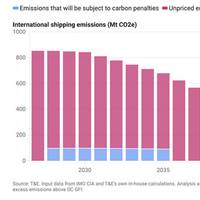
The IMO Net-zero Framework agreed at MEPC 83 last week is the first in the world to combine mandatory emissions limits and GHG pricing across an entire industry sector. The measures include a new fuel standard for ships and a global pricing mechanism for emissions. These measures, set to be formally adopted in October 2025 before entry into force in 2027, will become mandatory for large ocean-going ships over 5,000 gross tonnage, which emit 85% of the total CO2 emissions from international shipping.
IMO Progresses MARPOL GHG Chapter
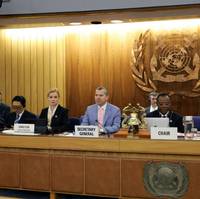
The IMO’s MEPC 81 meeting, concluded on March 22 with progress made on several fronts but the door left open to a number of risks, including that of architecture, timing, scope of emissions, compliance and enforcement, says consultancy UMAS.A new draft for a chapter in the Annex VI of MARPOL has been initiated titled “Regulations on the IMO net-zero framework”.Whilst, this new chapter is just a framework of subheadings for now, it includes all the elements needed to adopt any of the GHG policy options currently under consideration.
Momentum Builds For a Universal GHG Price
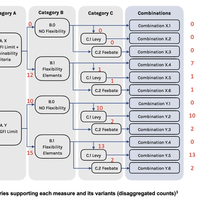
The 16th Meeting of the Intersessional Working Group on Reduction of GHG Emissions from Ships concluded with some progress made on the finalization of mid-term measures, and without a decisive shift in the landscape of positions and preferences.This meeting was the first convening of the IMO following the adoption of the Revised GHG Strategy in July 2023.Although it was already agreed in the Revised GHG Strategy to adopt both a GHG Fuel Standard (a mandate on GHG intensity of fuel/energy)…
Effectiveness and Equity Boost Needed for IMO Targets
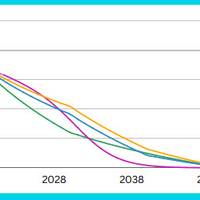
In a rare occurrence in the challenging politics of climate change, the IMO’s Revised GHG Strategy, adopted at MEPC 80 in July, represents a significant leap forward in ambition. New analysis by UMAS shows the IMO’s targets correspond to a path between 1.55oC and 1.6oC according to the GHG budget defined by the IPCC.Dr Tristan Smith, Reader at UCL Energy Institute, Director of UMAS, said: “The IMO’s revised strategy sets the scene for the large majority of shipping to have maximised efficiency by 2030 and transitioned away from fossil fuels by 2040.
UMAS Says Energy Efficiency Needs to Improve by 40%
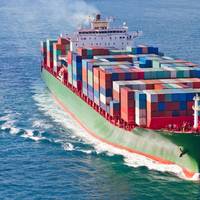
A new report by maritime advisory service UMAS has put figures on the energy efficiency improvements that are needed for international shipping if it is to meet the IPCC-derived 1.5ºC decarbonization pathway.This magnitude of GHG reduction, 37% in 2030 and 96% in 2040 on a 2008 baseline, has also been championed by some states as the targets that IMO should use in its revised GHG reduction strategy – due for adoption at MEPC 80 in July this year.UMAS states that, irrespective of how new fuels enter the global fleet…
EU Green Finance Rules Leaky for Ships
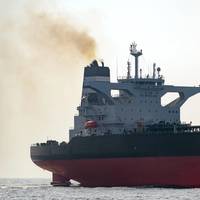
Months of EU deliberation to decide which business activities can be marketed as green investments have produced a set of draft standards some finance officials and NGOs say are lax for the polluting shipping sector and challenging for buildings.In other cases, they strike a fair balance, they say.As the European Union pursues regulation to try to deliver the 2015 Paris Agreement on climate change, a powerful tool in channeling funding over the coming decades will be its financial taxonomy - in other words…
Shipping's Share of Global Carbon Emissions Increases
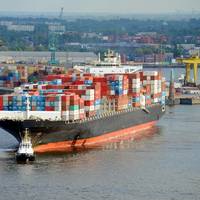
Carbon emissions from shipping rose in the six-year period to 2018 and accounted for 2.89% of the world’s CO2, a study released on Tuesday showed, amid growing pressure on the industry to bring levels down.About 90% of world trade is transported by sea and UN shipping agency - the IMO - aims to reduce the industry’s overall greenhouse gas emissions by 50% from 2008 levels by 2050.The report - the fourth in a series commissioned by the IMO - said shipping's share of global CO2 emissions increased to 2.89% in 2018 from 2.76% in 2012, when the last study period ended.CO2 emissions grew to 1,056 m
IMO's 2050 Decarbonization Target Has $1 Trillion Pricetag
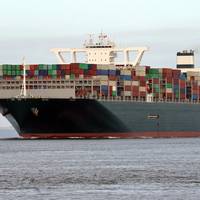
At least $1 trillion of investment in new fuel technology is needed to enable the shipping industry to meet U.N. targets for cuts in carbon emissions by 2050, a study published on Monday showed.The global shipping fleet, which accounts for 2.2% of the world's CO2 emissions, is under pressure to reduce those emissions and other pollution. About 90% of world trade is transported by sea.U.N. shipping agency, the International Maritime Organization (IMO), aims to reduce the industry's greenhouse gas emissions by 50% from 2008 levels by 2050…
Tracking Ship Emissions from Space
A new ground-breaking study by University College London (UCL) Energy Institute, Imperial College and the University of Oxford shows how satellite tracking could be used to monitor compliance with the upcoming IMO 0.5% sulfur emission regulations and Emission Control Areas (ECA).Research conducted by their own researchers, UCL Energy and the University of Oxford and published today in Geophysical Research Letters, has unveiled discoveries that appear important on many levels for they describe the impact of shipping emissions on the climate: because fossil fuel emission particles from ships affect the air including by releasing sulfur…
Green Shipping Fuels of the Future
Ammonia and hydrogen are promising potential fuels of the future in a de-carbonized shipping industry, which has to switch to alternative, zero carbon fuels in order to meet the targets set out in the initial International Maritime Organization (IMO) strategy on reduction of GHG emissions from ships, an IMO symposium on sulfur 2020 and alternative fuels heard on Friday (18 October).Setting the scene, IMO's Edmund Hughes said the initial GHG strategy, adopted in 2018, had sent a clear signal that shipping will need to adapt. "We have to change to address global climate change," he said."We have to find new technologies and new fuels if we are to achieve at least 50% reduction in annual GHG emissions from international shipping by 2050…
The Poseidon Principles: De-carbonizing Global Shipping
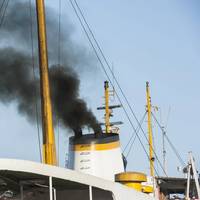
The Global Maritime Forum, banking institutions and other maritime industry stakeholders have developed the Poseidon Principles, a global agreement among financial institutions with the aim of decarbonizing shipping. Named after the Greek God of the sea, the Poseidon Principles aim to reduce carbon emissions by aligning financial institutions’ shipping portfolios with (IMO target of a 50 percent reduction in emissions by 2050. The global framework will establish a common way of assessing and disclosing whether a bank’s lending portfolio is compatible with broader climate goals.Søren Toft…
Decarbonization: 34 Maritime CEOs Call for Action

A who’s who list of maritime industry executives have signed on to voice their support for a zero-carbon future in shipping.The not-for-profit foundation the Global Maritime Forum brought together a group of 34 CEOs and industry leaders from across the global maritime sector to sign a call for action and lead the industry in a transition toward decarbonization.To achieve this, these leaders believe the maritime industry needs to accelerate both technological and business model innovation…
$400 bln of unassessed climate risk in shipping
Today, Carbon War Room (CWR) and UMAS released research that suggests climate transition pathways pose risks to the banks that hold $400 billion of global shipping debt. With the onset of climate policies as soon as 2023, there will be a need for significant capital investment to keep vessels competitive. Navigating Decarbonisation: An approach to evaluate shipping’s risks and opportunities associated with climate change mitigation policy lays out the first approach to climate stress-testing of shipping assets and proposes that enhanced due-diligence undertaken today by financiers, shipowners, and shareholders can help deliver long-term value and avoid losses by the mid-2020s.
Carbon War Room Launches Shipping Efficiency Advisory Board
Six leaders and influencers from across the shipping industry will join global NGO Carbon War Room’s (CWR’s) Shipping Operation Advisory Board. Their backgrounds span the shipowning, chartering, technical analysis, finance, and academic worlds. The board will lend extensive industry insight and support CWR’s mission to profitably decarbonise the international shipping industry. Galen Hon, Manager, Shipping Operation, Carbon War Room, commented: "Following UNFCCC in Paris, the industry has an obligation to find new and innovative ways to reduce carbon while remaining competitive. With expertise spanning finance, ship operation, classification, data analysis, technology, and software, these individuals are perfectly positioned to identify and evaluate opportunities for innovation and growth.
CWR Launches Shipping Efficiency Advisory Board
Six leaders and influencers from across the shipping industry will join global NGO Carbon War Room’s (CWR’s) Shipping Operation Advisory Board. Their backgrounds span the shipowning, chartering, technical analysis, finance, and academic worlds. The board will lend extensive industry insight and support CWR’s mission to profitably decarbonise the international shipping industry. Galen Hon, Manager, Shipping Operation, Carbon War Room, commented: "We are thrilled to have gathered a group with so much knowledge and experience in shipping. Following UNFCCC in Paris, the industry has an obligation to find new and innovative ways to reduce carbon while remaining competitive.
'Shipping & Climate' Change: Upcoming IMarEST Lecture
‘Shipping and Climate Change: how Science can aid an industry that emits more CO2 than the UK’ is second in the ‘Sea Changes Lecture Series’. The series, organised by the Institute of Marine Engineering, Science and Technology (IMarEST) in association with University College London (UCL), aims to examine the relationship between marine science, technology and engineering. ‘Shipping and Climate Change: how Science can aid an industry that emits more CO2 than the UK’, will take place in the Sir Ambrose Fleming Lecture Theatre, UCL, London WC1E 7JE on Monday 18 March, 2013. It will be presented by Dr Tristan Smith, UCL Energy Institute…






